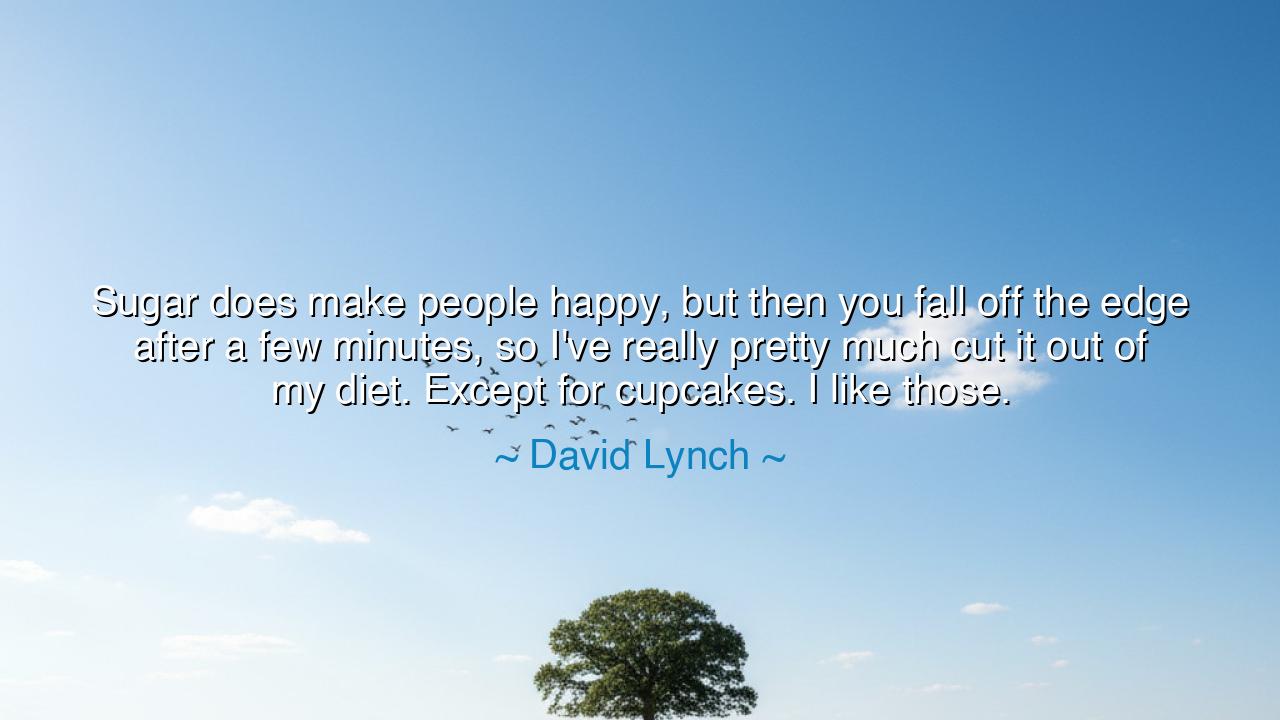
Sugar does make people happy, but then you fall off the edge
Sugar does make people happy, but then you fall off the edge after a few minutes, so I've really pretty much cut it out of my diet. Except for cupcakes. I like those.






When David Lynch said, “Sugar does make people happy, but then you fall off the edge after a few minutes, so I’ve really pretty much cut it out of my diet. Except for cupcakes. I like those,” he was not speaking merely of sweetness, nor of food, but of the ephemeral nature of pleasure and the discipline of awareness. Beneath his gentle humor lies a timeless truth — that not all things which bring us joy are meant to be consumed without caution. His words, simple and human, mirror the teachings of the ancients who understood that fleeting delight, if pursued without wisdom, leads not to happiness but to emptiness.
From the dawn of civilization, the sages have warned of the seduction of sweetness — not only of the tongue but of the heart. The ancient Greeks spoke of hedone, pleasure, as both gift and danger. It was to be enjoyed, yes, but always under the guidance of sophrosyne, or moderation. When Lynch speaks of the temporary high that sugar brings, followed by the inevitable fall, he echoes this same truth: unbridled pleasure is a flame that dazzles before it burns. The sweetness of life, like the sweetness of the cup, must be tasted with mindfulness, lest it enslave rather than enliven.
And yet, there is tenderness in his confession — “Except for cupcakes. I like those.” Here, Lynch reveals not asceticism, but humanity. He does not preach denial; he embraces balance. For even the monk who lives on lentils smiles once a year when the festival brings honey to his lips. The wise man is not the one who rejects all pleasure, but the one who chooses wisely, who knows the difference between nourishment and indulgence. Lynch’s cupcakes stand as symbols of this: a reminder that joy, when approached with reverence, can coexist with restraint.
Consider the story of the Buddha, who, before enlightenment, starved himself nearly to death in pursuit of purity. One day, a young woman offered him a bowl of rice and milk, and in that humble act, he found truth. He realized that neither starvation nor gluttony leads to peace — only the Middle Way, the path between extremes. In much the same spirit, Lynch’s words remind us that life’s sweetness is not meant to be banished but balanced. To cut away all pleasure is to live half-alive; to indulge in all pleasure is to live without anchor.
There is also a quiet spiritual warning in his insight — that the highs of the world, whether they come from sugar, success, or distraction, are fleeting. They lift us up, only to drop us when the illusion fades. The ancients compared such pleasures to foam on the sea: bright and sparkling, yet vanishing in an instant. The wise learn not to depend on these for happiness. Instead, they turn inward, cultivating the deeper sweetness of contentment, which does not fade when the taste is gone.
And yet, the humor of Lynch’s final confession — his fondness for cupcakes — reminds us that wisdom need not be joyless. The philosopher who never laughs, the saint who never smiles, has missed the essence of the human experience. The purpose of moderation is not to extinguish joy, but to protect it. By savoring sweetness in its right measure, we keep it sacred. The cupcake becomes not an indulgence of gluttony, but a symbol of gratitude — a celebration of life’s small mercies.
Let this, then, be the lesson for those who hear his words: do not chase happiness in the fleeting things that rise and fall like waves. Enjoy what is sweet, but let your joy come from awareness, not from excess. Eat with reverence, work with purpose, and rest with peace. Keep your mind steady even as the world tempts you with its sugar-coated delights.
For true happiness, as the ancients taught and as Lynch reminds us with his quiet wisdom, is not the rush of sweetness but the calm after it — the enduring satisfaction of a balanced heart. So take your sweetness as you take your breath — in small, mindful portions — and let your soul find nourishment not in the sugar of the moment, but in the steady sweetness of discipline, gratitude, and grace.






AAdministratorAdministrator
Welcome, honored guests. Please leave a comment, we will respond soon